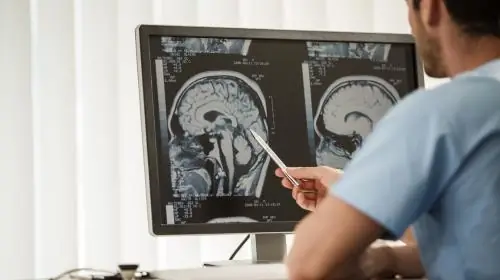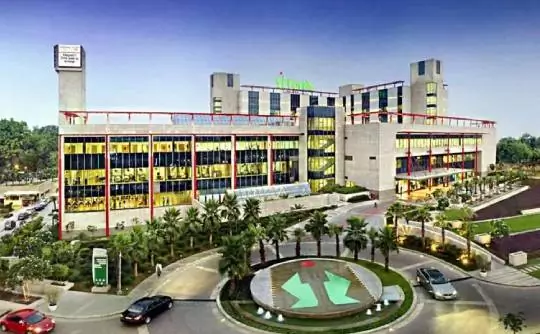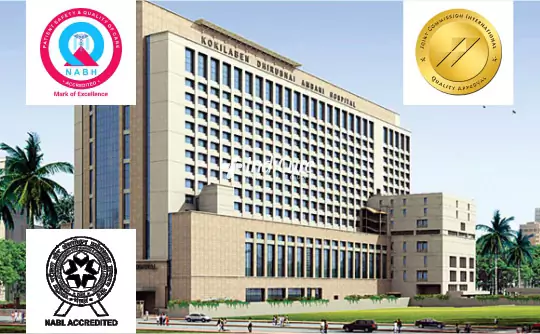

A significant component of the Brain Aneurysm Treatment Cost in India is the neurosurgeon's fees. IndiCure recommends highly experienced, skilled, board-certified neurosurgeons who can deliver excellent results. While the charges may vary based on the surgeon's experience, you can be confident that you are in safe and capable hands when opting for affordable brain aneurysm treatment in India with IndiCure.
Often, the most effective approach to treating a cerebral aneurysm may involve a combination of treatments, including surgery and other therapies. The costs associated with each treatment option can vary. IndiCure advises you to consult with our expert neurosurgeons to thoroughly understand your options.
Selecting an accredited medical facility with a skilled neurosurgeon and qualified medical staff is essential for the success of your brain aneurysm treatment in India. Larger cities in India generally provide superior medical facilities and more experienced surgeons, leading to higher costs. IndiCure Health Tours recommends surgical facilities in these larger cities to prioritize quality of care and ensure patient safety.
The surgery-related expenses include the pre- and post-surgical expenses. The pre-surgical expenses are associated with the age and medical condition of the patient and thus the number and type of investigations required. Post-surgical expenses may include prescription medications and follow-up consultations.
At IndiCure, we consolidate most of the expenses for your Brain Aneurysm Treatment in India to provide you with an inclusive and cost-effective package tailored to your budget and individual requirements. After receiving medical reports, your case manager will provide an estimated cost based on a discussion with the neurosurgeon.
The final Brain Aneurysm Treatment cost in India can however be confirmed after your face-to-face consultation with the surgeon.

We Help you Choose the Right Treatment, Surgeon & Hospital

We Arrange Video/Telephonic Consultation with the Surgeon

We Assist you with Visa & Accommodation

We Receive you at the Airport and Drop you at Hotel/Hospital

We Assist you the at Hospital & Provide Post Operative Support
IndiCure offers exclusive savings on your medical travel. We partner with hospitals to negotiate special rates, ensuring you get the best possible price on your healthcare when you travel with us.

Here is a set of questions you should consider asking before commencing your medical tour for Brain Aneurysm treatment in India.
Prepare to answer questions about your:
An aneurysm is a bulging or ballooning in a blood vessel in the brain, often known as a cerebral aneurysm. It generally resembles a berry hanging from a stem.
A cerebral aneurysm can burst or leak, resulting in brain hemorrhage (hemorrhagic stroke). The region between the brain and the delicate tissues covering the brain is where a ruptured brain aneurysm most frequently develops. A subarachnoid hemorrhage is the medical term for this kind of hemorrhagic stroke.
Aneurysm ruptures can turn life-threatening and necessitate immediate medical attention.
However, the majority of brain aneurysms do not burst, result in medical issues, or produce symptoms. These aneurysms are frequently found during examinations for other disorders.
A sudden, severe headache is the key symptom of a ruptured aneurysm. This headache is often described as the "worst headache" ever experienced.
Common signs and symptoms of a ruptured aneurysm include:
Leaking aneurysm: In some cases, an aneurysm may leak a slight amount of blood. This leaking (sentinel bleed) may cause only a:
Unruptured aneurysm: An unruptured brain aneurysm may produce no symptoms, particularly if it's small. However, a larger unruptured aneurysm may press on brain tissues and nerves, possibly causing:
The causes of brain aneurysm are unknown, but a range of factors may increase your risk.
The likelihood of a brain aneurysm or an aneurysm rupture can rise as a result of artery wall weakness caused by a variety of circumstances. Adults are more likely to have brain aneurysms than children, and women are more likely to experience them than males.
Some of these risk factors are present at birth, while others emerge over time. The cause of a brain aneurysm is unknown. These factors, according to researchers, irritate and weaken blood vessels:
In some circumstances, treatment for a brain aneurysm that has not ruptured may be necessary to avoid a future rupture.
You can get assistance from a neurologist in deciding if the recommended course of treatment is right for you by working with a neurosurgeon or interventional neuroradiologist.
When recommending a course of treatment, the following is taken into account:
An aneurysm in the brain that has not ruptured can be treated in one of two ways:
Emergency surgery is required for a brain aneurysm that is leaking or bursting. However, it's possible that a brain aneurysm won't be discovered until after you've had an imaging test for another condition.
Your doctor might advise against treating a tiny brain aneurysm if it isn't creating symptoms and you don't have any other pertinent risk factors. Instead, to rule out any alterations or growth over time, your doctor will schedule routine imaging exams. Additionally, they will advise you to stop smoking (if you are a smoker) and demand that your blood pressure is kept under control. If you experience symptoms or follow-up imaging reveals aneurysm change or growth, you should seek immediate medical attention.
Your healthcare practitioner will go over the advantages, hazards, and other treatment options with you if you have symptoms, favorable risk factors, or a large aneurysm. The choice is based on some things, not the least of which is you:
Brain aneurysms, whether ruptured or not, are treated with surgery and/or endovascular therapy or Flow Diversion. The procedure is done under general anesthesia.
Surgical clipping- Your surgeon makes a tiny incision in your head during this surgery to gain access to the aneurysm. Your surgeon places a tiny metal clip to the aneurysm's base using a tiny microscope and tools to pinch it off.
By doing this, blood cannot enter the aneurysm. The procedure can prevent an intact aneurysm from rupturing or stop a brain hemorrhage. The length of recovery varies depending on whether an aneurysm ruptured (many weeks to months) or not (typically two to four weeks). This technique is thought to be long-lasting and has a low recurrence rate.
Endovascular coiling (coil embolization, stenting, balloon remodeling, flow diversion, intraluminal web device) - Your surgeon doesn't have to make a hole in your skull for this treatment. Instead, a medical professional threads a catheter—a flexible tube—through a blood vessel—typically in the wrist or groin—and into your brain.
Your doctor inserts a tiny ball of platinum-coated wires (which resembles a ball of yarn) into the aneurysm through the catheter, occasionally with the aid of tiny stents or balloons. Recently, another tiny gadget (named Web) that functions similarly to coils and resembles a mesh ball made of nickel titanium also became available.
Both techniques lead to the creation of blood clots inside and around the wire ball or web device, which stop blood flow into the aneurysm and lessen or completely eliminate the danger of rupture.
Flow Diversion- This is a relatively newer technique. The procedure uses a catheter that is woven up a blood artery from the wrist or groin to the brain. Your doctor will then insert a mesh tube into the section of the blood vessel that the aneurysm is in using the catheter. Blood is encouraged or directed away from the aneurysm by the mesh.
Based on your vascular anatomy, the size and location of the aneurysm, and a number of other factors, your doctor will advise you on the best course of action.
The results of the surgery are very gratifying. The treatment of a cerebral aneurysm is generally very safe, and the outcome is usually good.
It usually takes one week for a person to fully recuperate, during which time they gradually resume their normal activities.
Your doctors will advise you to take it easy in the initial days following your coiling treatment and refrain from driving, engaging in intense activity, or lifting objects heavier than a milk carton. It is recommended that you keep an eye out for any signs of infection at the location of the incision if you have headaches, nausea, or exhaustion. Medication may be provided to you to treat pain or other problems.
It will take 3 to 6 weeks to fully recover. If you had bleeding from your aneurysm this may take longer. You may feel tired for up to 12 or more weeks. If you had a stroke or brain injury from the bleeding, you may have permanent problems such as trouble with speech or thinking, muscle weakness, or numbness.

Gurgaon
Fortis Memorial Research Institute (FMRI), is a multi-specialty, quaternary care hospital and is among the best hospitals in India. The hospital is considered as "Mecca of Healthcare" and a referral hospital, not only in the entire Asia Pacific but much beyond.

Mumbai
Kokilaben Dhirubhai Ambani Hospital is one of the most advanced and modern hospitals in India. It is a state-of-the-art tertiary care multi-specialty hospital located in the biggest suburb of Mumbai- Andheri. The hospital was launched by Reliance Group in 2008.
In the United States, ABOUT 6% of people have an unruptured brain aneurysm. Ruptures are rare, affecting about 30,000 Americans annually.
A brain aneurysm is more likely to occur if you:
After speaking with your primary care physician, it might be acceptable to check out the children or siblings of first-degree relatives if one individual has a brain aneurysm. Magnetic resonance imaging (MRI) scans are frequently used to perform these tests.
According to studies, the relationship could exist between 10% and 20% of the time. However all have demonstrated that medical professionals occasionally discover that relatives of aneurysm patients also have aneurysms. If you or any members of your family have other cerebral aneurysm risk factors, this risk increases even further.
The precise reason why an aneurysm ruptures or leaks, causing bleeding in or around the brain, is still unknown. However, anything that raises blood pressure has the potential to be harmful. Blood pushes against blood vessel walls more forcefully at higher blood pressure levels. The following are some factors that could raise blood pressure:
Most individuals with unruptured brain aneurysms are unaware of their condition. Typically, it doesn't produce any symptoms or even any pain.
However, while looking into the reasons for chronic headaches, numerous smaller (and not just larger) aneurysms are discovered. Headaches and an unruptured aneurysm may or may not be causally associated, according to researchers. One theory is that the enlarged blood vessel is pressing against the nerves and surrounding membranes and tissues, resulting in the headache.
A ruptured aneurysm can cause a sudden, severe headache (sometimes known as a "thunderclap headache"). Rarely, an aneurysm that is bleeding a small amount of blood might also cause a headache to continue for days or weeks. Sentinel headaches are this kind of persistent headache. It serves as an alert that the aneurysm is going to rupture.
Headaches are one of the primary indicators of an intact aneurysm. Other indications could be:
A leaking or ruptured brain aneurysm poses a life-threatening risk. It necessitates immediate medical attention. A ruptured brain aneurysm headache is frequently described as the worst headache a person has ever experienced. The excruciating headache appears out of nowhere and might continue for hours or days.
You might experience some of the same symptoms of an unruptured aneurysm in addition to a strong headache (see list above). Possibly you could also have:
It is unlikely that an aneurysm will go away on its own after being discovered. However, leading a healthy lifestyle can lower the chance of aneurysm growth, change, rupture, or new aneurysm formation. You can do the following:
Unruptured brain aneurysms can be undetected for the entirety of a person's life. You stand a good chance as long as it's whole. However, there is a chance that the aneurysm in the brain will burst. This risk relies on a number of variables, including the aneurysm's size, location, and other elements. A hemorrhagic stroke is brought on if an aneurysm ruptures, leaking blood into the area around your brain and occasionally into the brain tissue itself.
Emergency medical care is required for a ruptured brain aneurysm. The risk of death or disability increases as time goes on with a ruptured aneurysm. With a ruptured brain aneurysm, about 75% of patients survive for more than 24 hours. However, one-fourth of the survivors could experience fatal consequences within six months. Your chances of survival are higher the sooner you can receive medical care.
Blood rushes into or around the brain when the aneurysm ruptures or leaks. The irritated brain tissue caused by the blood pooling might cause swelling of the brain. Permanent brain injury, stroke, or further issues like:
It's crucial to discuss your treatment and management choices with your healthcare physician if you have an unruptured brain aneurysm. You and your healthcare practitioner may decide that it's best to closely monitor it and manage medical conditions that could further erode the blood vessel, or you may decide that getting therapy done as soon as possible is the best course of action. Your healthcare physician will consider the aneurysms among other things:
Apart from the brain aneurysm treatment cost in India, there are additional expenses to consider when planning your trip. This includes budgeting for meals, airfare costs which will vary depending on your location of origin and the time of booking, and ground transportation expenses, such as taxi fares or rental car costs. Lastly, accommodation costs during your recovery period are crucial to consider, whether you opt for a hotel near the medical facility or other lodging options that suit your preferences and budget.
By carefully considering these additional expenses alongside brain aneurysm treatment cost in India, you can better plan and budget for your trip to India, ensuring a smooth and comfortable experience during your recovery process.
Traveling abroad for medical reasons may be challenging. With our experience of over a decade and working with the best surgeons and top hospitals in India, we help make your medical tour easier and safer for you. We will guide you at every step of the way and make end-to-end arrangements for your surgery, travel, and stay.
Ramandeep Dhaliwal
I had great experience having rhinoplasty through Indicure. Dr. Ruchika from Indicure has helped me in finding best plastic surgeon, answering all my questions...
Read More
Joshua Archer
My name is Joshua Archer I'm from New Zealand, bay of plenty, kawerau I opted for the bypass surgery in January 2023 but planned it in advance for 28 September found IndiCure...
Read More
Kera Ren
Absolutely loved my experience with IndiCure - from first inquiring to meeting the surgeon pre op to my follow up post op. The surgeon was extremely approachable...
Read More
Andreana Paul
Had a wonderful experience. Visited India for my plastic surgery. From sending mails, airport pickup, comfortable accommodation and, to smooth hospital appointment booking...
Read More
Brandi Luce
I had the privilege of using Indicure's services for a cosmetic procedure that I had wanted for a long time but had always been apprehensive about. Ruchika helped me...
Read More
Jade M
Indicure Health Tours went above and beyond my expectations. They helped me with every aspect of my journey and were professional, kind and caring. I was...
Read More
The content on the website (www.indicure.com) is intended to be general information and is provided only as a service. All photographs on our website of before and after results are examples only, and do not constitute an implied or any other kind of certainty for the result of surgery.
Learn about IndiCure Health Tours' comprehensive editorial policy that strives to deliver trustworthy, helpful, relevant, accurate and people-first content on medical tourism in India.
It is not medical advice and should not be taken as medical advice. It should not be used to diagnose or treat a health condition and is in no way meant to be a substitute for professional medical care. You are advised to see a surgeon in person to assess what surgery may or may not accomplish for you.
It is also important to keep your expectations realistic and to understand that all surgical procedures carry risks and should never be taken lightly.